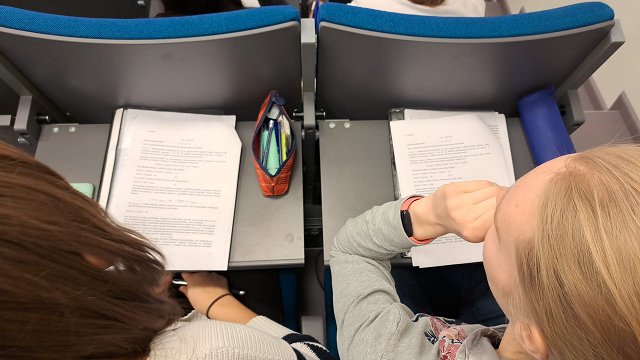The "Nuclear Medical Center" opened its door in 2016. It used the modern PET/CT cancer diagnostic method, which allows for spotting cancer cells at an early stage with computer tomography. The project was initiated by the Rīga Stradiņš University (RSU), pharmaceutical entrepreneur Vitālijs Skrīvelis, and the PNB Bank (Norvik then) which had given a loan of several million euros, and for which the company with all its assets were pledged. The center also raised large amounts of European funds – EUR 4.7 million.
Overall, more than EUR 9 million was spent on the creation of the center, including construction and equipment.
In a few years, though, the center's doors closed. At the auction held by the bailiff last year, for a much smaller amount than invested – less than EUR 2.5 million without VAT – it was purchased by the medical dealer Arbor. Arbor's subsidiary, Nucleo, now holds the property.
Both the building and valuable facilities were pledged. As the most important of them, Arbor's owner and chief executive of Nucleo, Dace Rātfeldere, highlighted the cyclotron purchased by the Belgian company Ion Beam Applications. It can produce a preparation that is injected into the body so that cancer can be detected. Nucleo wishes to produce and distribute the preparation.
The bailiff Andris Spore said that the property was initially valued at 3 million euros, but no one applied, so in the second round, the price was reduced.
“At the second auction, one bidder participated but did not pay the full purchase fee and the auction was declared uneventful,” Spore explained. “A second auction was held and this real estate and the movable property were purchased at the repeated second auction.”
Rātfeldere, asked why the valuable property had not been more competitive, concedes that the object had been too complicated for others.
RSU's opinion
LTV asked Rīga Stradiņš University prorector Toms Baumanis whether it did not turn out that the private company Arbor in the end benefited from the funds raised by RSU.
Baumanis said: "Well, it could be said so. Everyone could already participate in that auction. Asked if anyone wanted to do it. We also once called on the Latvian medical industry flagships, perhaps to buy back this project so that it would be viable."
Bauman was a member of the Board of the Nuclear Medical Centre for the entire duration of its operation. The university's own contribution to the core capital of the Centre was EUR 444,000, but another EUR 100,000 was also paid by a research fund established by RSU at the end of 2016.
“The university lacked money and this fund is in support of the university,” Baumanis said. “At the time, the university's decision was that this money could be invested by the fund, but the basic idea was that we needed this technology, to save this enterprise.”
The Center's annual reports show that the university transferred tens of thousands of euros a year to it for the rental of premises. Baumanis said that RSU radiology researchers worked at the center. In his opinion, the project of the center failed for a number of reasons, but the main one was that studies with the method used by the center were not paid for by the State to a sufficient extent, while there were too few solvent patients.
The final straw was the end of 2019, when the PNB bank became insolvent and claimed to return the debt, according to Baumanis, more than EUR three million.
“We acted as a university, nationally and in line with the public role of the university, and we were involved there as an organization of research, science, and medicine,” Baumanis said. “We have always been minority shareholders since this project was funded by the ERDF funds of the Ministry of Education and Science, where it was expected that the majority should belong to a private investor, a private owner.”
The private partner was a firm with a similar name, “Rīga nuclear medical laboratory.” At first, the only owner was Vitālijs Skrīvelis, the center's board chairman. But one year after the opening of the center, the Russian agro-businessman Evgeny Tugolukov became the largest owner, who gradually took over all parts of Skrīvelis through acompany in Cyprus. Skrīvelis did not respond to an interview request
Current proceedings
RSU Prorector Baumanis said that as early as 2019, the university decided to leave the center and sold the shares to Tugolukov for EUR 127,000. Although the money had already entered the university's account, Baumanis said that the business was not legally completed due to the bank's insolvency proceedings.
Marita Kataja-Paegle, the insolvency administrator of the Nuclear Medicine Center, disagreed to give an interview and stressed that no information on transactions could be provided. Nor was there a clear answer to whether she had seen any signs of law enforcement during the process.
In the meantime, the State Police confirmed that criminal proceedings have been initiated in connection with the “Nuclear Medical Center” after the second paragraph of Section 213 of the Criminal Law regarding the intentional rendering of a legal person to insolvency if it caused material damage to the interests of another person protected by law. The police declined to comment further.
The funding of European funds for the Nuclear Medical Centre was granted by the State Agency for Education and Development. Asked whether there was a risk that funding would have to be repaid, the agency responded dismissively. The three-year post-monitoring period for the project ended when funds purchased for European money was still at the center's disposal and were used for its purpose.




























